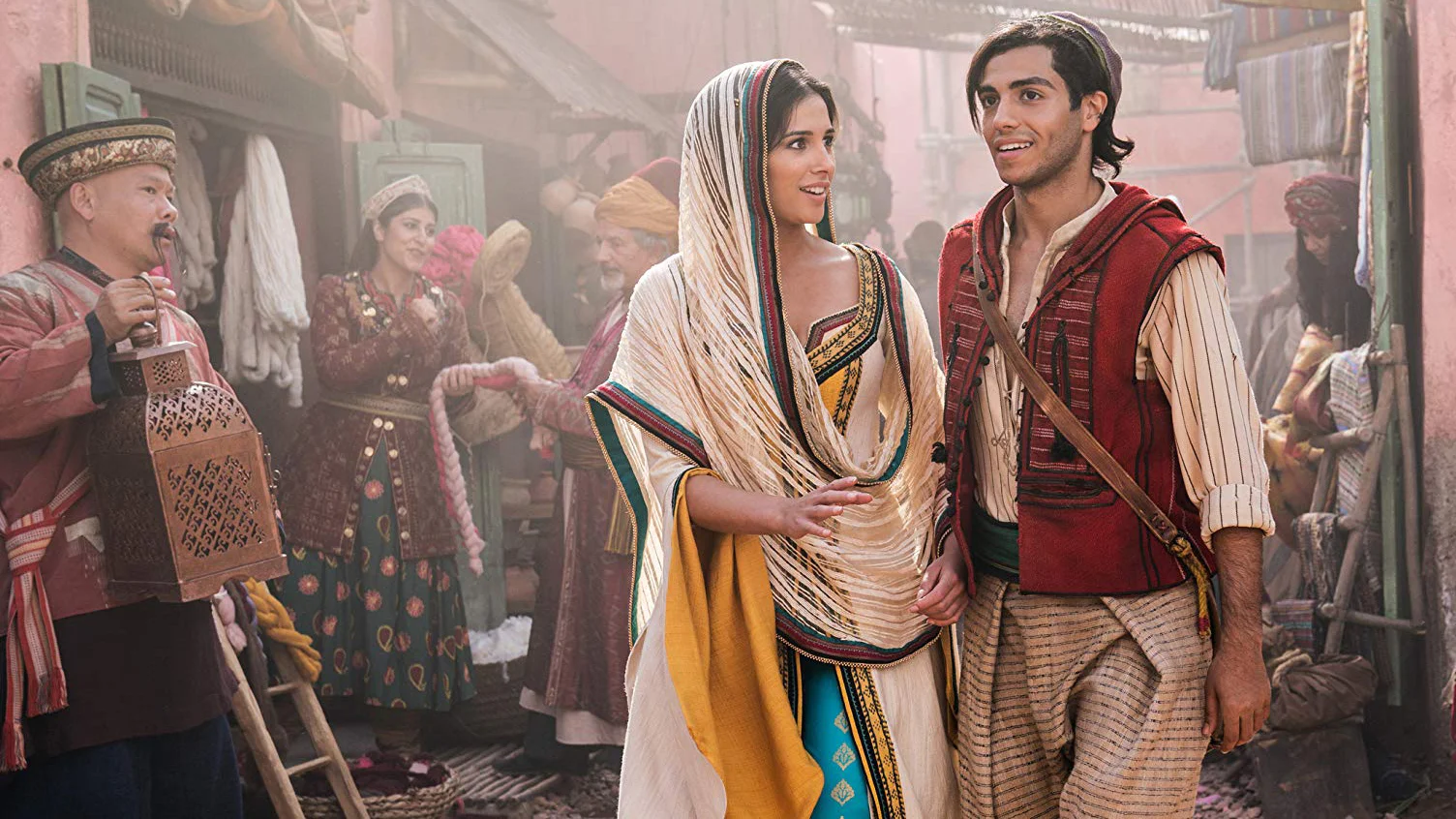REWIND REVIEW: Aladdin
For an occasional new segment, Every Movie Has a Lesson will cover upcoming home media releases combining an “overdue” or “rewind” film review, complete with life lessons, and an unboxed look at special features.
ALADDIN
After enjoying a billion-dollar run at the worldwide box office, Disney’s summer hit Aladdin descends to home media store shelves on September 10th. Directed by Sherlock Holmes franchise steward and kinetic auteur Guy Ritchie, the razzle and dazzle of this re-imagined classic impressed in many areas while it lacked in others. All of the spectacle is on display for DVD, Blu-ray, and 4K Ultra HD.
LATE HOMEWORK EXCUSE:
No pass of forgiveness is needed for Aladdin. I saw this one as large as possible at the Chicago Navy Pier IMAX before its release. The dashing visuals and colors played well on that massive format. This disc review will include portions of my full review from
ANTICIPATORY SET AND PRIOR KNOWLEDGE:
In front of Will Smith’s winking and bejeweled human form and his sizable and mystical sapphire sinew is a slightly thickened story true Disney fans know by heart. A handsome “street rat” sneaker named Aladdin (Canadian-Egyptian newcomer Mena Massoud of Hulu’s Jack Ryan) catches the appreciative and alluring eye of Jasmine (pink Power Ranger Naomi Scott), the Princess of Agrabah, an independent spirit lamenting the trappings of her regal stature and required betrothal to fellow royalty. The handsome hustler also gains the prophecy-fulfilling curiosity of Jafar (Marwan Kenzari of Ben-Hur), the hypnotizing top advisor to the Sultan (12 Strong’s Navid Negahban), who is convinced the young man is the human key to the Cave of Wonders and a certain handheld beacon that likes being caressed by fingertips.
LESSON #1: EXCEEDING ONE’S INITIAL OR CURRENT PLACE — The moral dilemma of Aladdin has not changed. We have many “waited my whole life”-spewing characters trapped by their present or past places in society, complete with the corresponding weaknesses of confidence that accompany those tiers. Birthright, caste, hierarchy, gender, legislation, and other constraints like that pesky lamp all stand as potential causes. As the film and one of its new songs implores, too many good people are “seen and not heard.” Truthful resolve and manufactured personal improvement are the dueling paths sought to change one’s “speechless” or limited circumstances.
Just as he did for 2017’s Beauty and the Beast revival, composer Alan Menken returned to his Oscar-winning score and songs. His involvement was vitally essential to maintaining a level of glow for the movie. The execution, however, is the tedious part. The new songs from the songwriting duo of Pasek and Paul (La La Land, The Greatest Showman) are too slight or misplaced in their moments. Massoud and Scott may look the parts, but their vocals cannot quite achieve all that is necessary for “A Whole New World,” arguably Disney’s greatest duet song in their expansive catalog (a bar that was, forgivably, not going to be topped). Will Smith and choreographer Jamal Sims save the day. Where the pipes fail on the audio tracks, the punchy footwork and gyrating gambols on camera provide the dazzle, making one wonder and wish Aladdin could have gone full Bollywood. Guy Ritchie used to have that panache so it’s surprising not to see on the biggest stage.
MY TAKE:
It is becoming increasingly tedious to both critique and enjoy these Disney “re-imaginings.” The teeter-totter between familiarity and freshness changes with each movie due to the modern desire to update and the soaring fan expectations set by the level of nostalgic adoration carried for each previous property. The results have been wildly mixed. Aladdin more of that middle with a tilting lean that could go either way. The studio and Sherlock Holmes series director Guy Ritchie aimed admirably with an “ambitious and non-traditional” take employing minority casting against whitewashing and colorism. Those skin-deep improvements are progressive, but who are we kidding? The color that mattered most was blue.
All the desired diversity in the world paled to who could possibly follow the late Robin Williams? The Genie is the ticket to more than just wishes when it comes to this reboot’s success. That laborious task was given to Will Smith. Folks, he is a hot, baking sun of swagger! Will has not been this loose and free since Men in Black 3 seven years ago. Aladdin reminds us how much of a consummate showman the 50-year-old is and always has been. Will has a style, energy, and stage presence all his own, and he saves this entire movie from sandy ruin.
Heading back to the symbolic piece of playground equipment, the casting and performances in Aladdin are one step forward and two steps back. Massoud and Scott represent closer matching minorities for the affair and their attractive chemistry together has smoldering warmth. Massoud’s winning smile will swoon many. For today’s empowering present, Scott’s Jasmine was positively bolstered with layers of independence and, thankfully, less sexualization than previous incarnations.
Unfortunately, the not-so-thin varnish of multiple unfavorable Arabic and Asian tropes, from accents to character behaviors, smears the rest of the human landscape of Aladdin. Negahban’s Sultan, for example, is terribly one-dimensional where even the doting towards his daughter is too slight to resonate as regality. The bigger vacuum is the main villain. Kenzari’s Jafar suffers from underwritten motivation and a somewhat unimposing performance. Had the same updating attention given to the Jasmine role been extended to that character by writers John August (Dark Shadows) and Guy Ritchie, the overall improvement could have increased the storytelling heights.
LESSON #2: REPRESENTATION ISN’T ENOUGH — The on-and-off irregularity of Aladdin is a unique situation. Yes, it is wonderful Disney sought people of color for this ethic fairy tale, but the clout of their portrayals and the substance of their actions are not improvements. If you’re going to do the right thing by diversity, go all the way, not just halfway or selectively. Dare to combat stereotypes completely.
2 STARS
EXTRA CREDIT:
As a home media release, the extras here for Aladdin are rather thin. Whether it’s been their own branded titles or the Marvel ones, the disc special features for the Mouse House’s offerings have been disappointing for too long. When you have a hands-on and energetic filmmaker like Guy Ritchie and the always-on charisma of Will Smith, the potential for interesting and entertaining behind-the-scenes content is huge. This Aladdin doesn’t even contain a basic director or writer commentary. At least the MCU films carry those.
Two items from the special features menu stand out as the best bits and bytes (and, no, it’s not the overplayed trailers for Frozen 2 or Maleficent: Mistress of Evil). The first is Mena Massoud’s collected video journal chronicling his experiences during the lengthy and labor-intensive international shoot. Edited down to a little over ten minutes from months of casual exploits, the open diary shows quite the full scope of what it took Ritchie and company to make this blockbuster from the eyes of an emerging actor at the center of it all.
It’s sad that his cellphone-shot footage is, with equal length, more compelling, revealing, and entertaining than the two tiny, fancy, and studio-created featurettes, “A Friend Like Genie” and “Guy Ritchie: A Cinematic Genie,” that precede it on the disc. The first of those does have Will Smith making an ever-so-brief and reflecting nod to the history of Robin Williams that came before him, but then it’s the bouquet parade of shared compliments. The same goes for the portrait of the director, which also is too short to really give a taste of the artistry that comes with his camera speed shits, angles, and sense of pacing. Without a commentary track of Ritchie or Smith really conversing, we’re missing so much backstory.
The second stellar feature is an outstanding deleted song entitled “Desert Moon.” It’s a lovely duet between Massoud and Scott that is sung separately as the characters reflect after parting away from each other earlier in their courtship and before Aladdin is thrust into the Cave of Wonders. The scene was fully shot and edited, only to become a late and erroneously scratch from the final film. With sweet lyrics from Benj Passek and Justin Paul, this ballad might be better than any of the other original songs that stayed in the final 128-minute picture. This is must-see.
Those are four minutes that could have added romantic weight to the movie. The other deleted scenes are mostly trims of other exchanges. Naturally, Will Smith’s humor dominates the blooper reel for easy laughs and tension-breaking shenanigans. Lastly, with its musical spine, the Aladdin disc contain three lavish music videos. The first is for Naomi Scott’s powerful “Speechless,” the song the studio is likely stumping for when it comes time for Oscar consideration in the Best Original Song category. Two versions of “A Whole New World” are included as well. The first is the end credits update performed by Zayn and Zhavia Ward. The second is a Spanish version “Un Mundo Ideal” by Zayn and Becky G., a nice addition for the sizeable international audiences.
LOGO DESIGNED BY MEENTS ILLUSTRATED (#822)



